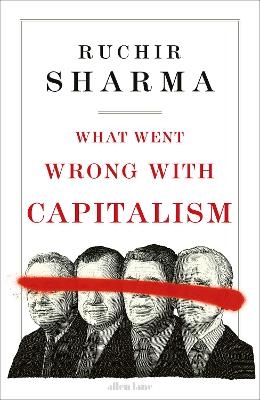
What Went Wrong With Capitalism
Seiten
2024
Allen Lane (Verlag)
978-0-241-59576-3 (ISBN)
Allen Lane (Verlag)
978-0-241-59576-3 (ISBN)
*A Financial Times and Wall Street Journal Book of the Year*
A radical examination by a leading financial analyst, commentator and investor of the ills of capitalism and how they can be fixed
What went wrong with capitalism? Ruchir Sharma’s explanation is unlike any you have heard before. Progressives are partly right when they mock modern capitalism as “socialism for the rich,” but what really happened in recent decades is that government in developed nations expanded in just about every measurable dimension, from spending and regulation to the sheer scale of its rescues each time the economy wobbled. The result, Sharma says, is “socialized risk,” expensive government guarantees, for everyone—welfare for the poor, entitlements for the middle class, and bailouts for the rich.
Voters say they are disillusioned with capitalism, but a system so distorted by government interventions is a dysfunctional version of free market ideals. As a result, productivity and economic growth have slowed sharply, shrinking the pie for everyone and stoking popular anger. Since these flaws developed as the government expanded, building an even bigger state will only double down on what’s gone wrong. The answer Sharma offers is a series of seven fixes to restore the balance between state support and free markets and lay the path to a more prosperous and happier future.
A radical examination by a leading financial analyst, commentator and investor of the ills of capitalism and how they can be fixed
What went wrong with capitalism? Ruchir Sharma’s explanation is unlike any you have heard before. Progressives are partly right when they mock modern capitalism as “socialism for the rich,” but what really happened in recent decades is that government in developed nations expanded in just about every measurable dimension, from spending and regulation to the sheer scale of its rescues each time the economy wobbled. The result, Sharma says, is “socialized risk,” expensive government guarantees, for everyone—welfare for the poor, entitlements for the middle class, and bailouts for the rich.
Voters say they are disillusioned with capitalism, but a system so distorted by government interventions is a dysfunctional version of free market ideals. As a result, productivity and economic growth have slowed sharply, shrinking the pie for everyone and stoking popular anger. Since these flaws developed as the government expanded, building an even bigger state will only double down on what’s gone wrong. The answer Sharma offers is a series of seven fixes to restore the balance between state support and free markets and lay the path to a more prosperous and happier future.
Ruchir Sharma is chairman of Rockefeller International and founder of Breakout Capital, a global investment firm. He moved to Rockefeller in 2022 after 25 years at Morgan Stanley Investment Management, where he was head of emerging markets and chief global strategist. Based in New York, he is a columnist at the Financial Times and a former contributing opinion writer at The New York Times. He is the author of four books, including the international bestseller Breakout Nations and the New York Times bestseller The Rise and Fall of Nations.
| Erscheinungsdatum | 07.06.2024 |
|---|---|
| Verlagsort | London |
| Sprache | englisch |
| Maße | 159 x 240 mm |
| Gewicht | 601 g |
| Themenwelt | Sachbuch/Ratgeber ► Beruf / Finanzen / Recht / Wirtschaft ► Wirtschaft |
| Wirtschaft ► Volkswirtschaftslehre ► Makroökonomie | |
| ISBN-10 | 0-241-59576-2 / 0241595762 |
| ISBN-13 | 978-0-241-59576-3 / 9780241595763 |
| Zustand | Neuware |
| Informationen gemäß Produktsicherheitsverordnung (GPSR) | |
| Haben Sie eine Frage zum Produkt? |
Mehr entdecken
aus dem Bereich
aus dem Bereich


